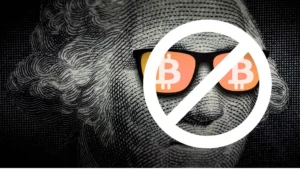Due to the global debate surrounding the legality of cryptocurrencies, there are various regulations and bans across different countries. Consequently, in Turkey, the “crypto ban” became a highly discussed topic within the cryptocurrency community. Turk Fortune aims to shed light on the uncertainties by exploring the question, “Are crypto and Bitcoin payments legal in Turkey?”. Furthermore, we’ll examine the implications of the April 16, 2021 regulation, which prohibits the use of crypto assets in payments, such as Bitcoin payments.
Is Bitcoin Payment Legal in Turkey Following the New Regulations?
On April 16, 2021, the Republic of Turkey started to try regulating Bitcoin and other crypto assets. To clarify, they published the “Regulation on the Non-Use of Crypto Assets in Payments” in the official gazette.
One of the most important rules of this regulation was the prohibition of accepting crypto assets as form of payment. In fact, paragraph 2 of Article 3 states: “Crypto assets cannot be used directly or indirectly in payments.”.
Nevertheless, is this prohibition truly enforceable? According to the Turkish legal system, can you restrict people only by issuing a mere regulation? Are there actual penalties for individuals or businesses accepting Bitcoin or other crypto assets for goods and services?
Difference between Laws and Regulations within Turkey’s Legislative System
It’s crucial to understand the distinction between “Regulation” and “Law” in Turkey. To clarify, according to the Constitution, the government can only impose penalties through the enactment of laws. In other words, laws hold a higher hierarchical position than regulations. Hence, as per the Constitution, the government can only enforce penalties by passing laws, not regulations.
In the same vein, we examined the “Law on the Central Bank of the Republic of Turkey” and the “Law on Payment and Securities Settlement Systems, Payment Services and Electronic Money Institutions,”. To clarify, these are the underlying laws for the aforementioned Regulation. However, within these laws there were no penalties related to accepting bitcoin payments or crypto assets. Despite scrutinizing these underlying laws, we couldn’t find any legal basis for penalizing merchants accepting crypto assets as payment.
The Message of Turkey’s Central Bank about the Prohibition of Bitcoin Payments
To clarify any potential misunderstandings, we directly contacted the Central Bank of the Republic of Turkey. That is to say, this is the institution responsible for implementing the regulation. After all, if they want to penalize merchants, they should at least know which law they are going to do it based on, right?
We presented the following inquiries to the Central Bank:
- What penalties apply to individuals or businesses accepting crypto assets?
- If penalties exist, which article of law supports these penalties?
- If penalties exist, which institution or department possesses the authority to determine and enforce them? What is the process for identifying prohibited activities and assigning penalties?
- If penalties exist, does the Central Bank of the Republic of Turkey conduct proactive investigations on all individuals and businesses involved in selling goods and services, or are sanctions imposed solely through the complaint procedure?
- If there is no penalty as stated above, is there another sanction regulation that the Central has not shared with the public despite its decision? If yes, what is the article of law that constitutes the basis for this?
Luckily, the Central Bank responded quickly to the questions we sent. However, their answers were rather vague, indirect, and ambiguous. In fact, the response from the Central Bank did not answer any of our questions properly.
Central Bank’s response:
In short, they gave us the following answer: “The Bank continues to closely monitor the potential benefits and advantages of the technologies used by and associated with crypto assets. On the other hand, efforts to evaluate the regulations regarding services and transactions related to crypto-assets, including crypto-asset trading platforms, and general issues continue with the participation of relevant institutions under the coordination of the Republic of Turkey Ministry of Treasury and Finance. As a result, to make a legal assessment regarding the issues mentioned in your request for information, it is necessary to make an official application to our Central Bank.”
In other words, the Central Bank is still in the process of evaluation and collaboration with the Ministry of Treasury and Finance. At the end of the day, they were unable to provide any specific penalty clauses. Our initial message reminded them that government could only regulate penalties through the law, which must be public. Although they requested a formal application, they left our question about the complaint process unanswered, which indicates the absence of a mechanism for filing complaints to ascertain the outcomes.
Fortunately, the vague and incomplete nature of their response works in our favor. You might wonder, “How?”
What Does the Absence of Clear Penalties Imply According to the Constitution of Turkey?
Let’s examine Article 38, paragraph 1 of the Constitution, which states, “No one shall be punished for an act that was not considered a crime at the time it was committed; and no one shall be subject to a heavier penalty than that which was applicable at the time the act was committed.”
Additionally, paragraph 3 of the same Article 38 states, “Punishment and security measures instead of punishments, shall be prescribed only by law.”
The legal literature refers to these two articles as “the principle of retroactivity of laws” and “the principle of legality in punishment,” respectively. In essence, without a penalty determined by law, nobody can establish a genuine prohibition. Even if a penal code is enacted in the future, it would not retroactively cover past acts. Therefore, the government can only impose penalties by law, and such law can only affect acts committed after the law’s enactment.
Are Crypto or Bitcoin Payments Subject to Punishment in Turkey?
Consequently, our legal research yielded no penalties, and the competent authority was unable to provide a definitive answer. It’s important to note that the Central Bank’s jurisdiction is determined by law, and it currently lacks the authority to impose penalties on anyone.
Despite extensive research, we found no penalties apply to individuals or companies wishing to accept Bitcoin or other crypto assets as payment in Turkey. We consulted the most authorized institution pointed out by the relevant regulation on this issue and they could not satisfy our curiosity on this issue. It seems that there is no penalty that a person or company that wants to accept Bitcoin or crypto assets as payment in Turkey will be subjected to just because of this act, and there is a ban that is not clearly regulated what the penalty is. Merchants who want to accept Bitcoin and crypto assets are facing a monster without teeth or claws.
For further information, please contact the experienced lawyers of Turk Fortune.

Related Videos
Related Articles
We are always happy to hear from you!
info@turkfortune.com
Phone:
+90(546) 577 73 18
Addresses:
Büyükdere Cad, Mecidiyeköy Mah. No:81 Kuğu İş Merkezi Floor:4 No:7, Şişli/İSTANBUL
Mansuroğlu Mah. 286/1 Sk. No:1 Floor: 2 Office: 217 Bayraklı/İZMİR


















